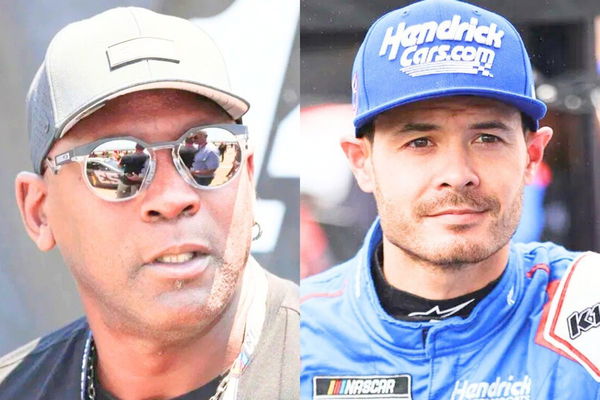
via Imago
Credits: Imago

via Imago
Credits: Imago
The High Limit Sprint Series is revving up to its final three schedules for this Season at Perth Motorplex. Kyle Larson, who co-owns the series with Brad Sweet, buckles up for a third stint with the 2025 schedules. He looks ahead to the Las Vegas Motor Speedway as the Season Opener. At this juncture, it is worth peaking at what the founders envisioned for the series; especially given the NASCAR ruckus over a monopolistic path.
The highlight is the 2021 NASCAR Cup Series Champion appearing on the Race Industry Week 2024, the 5th of its series. This live-streamed webinar, which will air until December 5th between 5:30 AM and 2:00 PM PT, had ‘Yung Money’ as one of the inaugural speakers. Here, the host, Brad Gillie, got caught in the healthy way High Limit publishes the Seasons’ player payout on the website and came around Larson for his takes. This turns out intriguing in the context of Michael Jordan’s 23XI and Bob Jenkins’ Front Row, up for a legal suit over a charter renewal perpetuating an unsustainable payout from NASCAR.
Larson, here, answered while hinting to go in depth: “You know, when we started our series was to try just make it healthier for the teams and, especially the teams, but you know the drivers involved also. See I think it’s important to advertise you know what we’re paying out and do we still want to get way better, you know it’s not, it’s a lot of better than what the All-Stars were but it’s still you know probably got room to grow.”
ADVERTISEMENT
Article continues below this ad
He then painted a larger picture, saying: “It’s just tough, you know you have to have the money to do it. And your crowds play a big part in that so you know we try to strive for making our show really entertaining to get the crowds and all that. And then we’re still kind of working through. You know how a charter looks in spring car racing? You know, it’s quite a bit different from NASCAR. Obviously, you know with the massive TV contracts and stuff like that, that comes in there. So trying to figure out the right way to shape that, to make it beneficial for everybody involved and make it better than what it is.”

The 32-year-old NASCAR racer also sounded futuristic while stating: “So yeah, still trying to work through that. It’s really tough. We’re working really hard at it, and hopefully, we’ll have some information here soon and then we can paint a better picture for the long term of how it’s going to grow and be more financially beneficial for the team owners.” Here, Kyle Larson deftly avoids space for a Michael Jordan-esque lawsuit, which makes it tempting to draw parallels with NASCAR’s profit share culture.
Until 2015, there was transparency in payouts, as teams didn’t have a stable revenue. This was when the stock car racing company introduced a charter system with 36 charters originally for 19 teams in 2016. While offering stable revenue, prominent teams like Hendrick Motorsports blatantly criticized the economic model, with its vice chairman Jeff Gordon revealing this in 2022: “Where we’re currently at is not sustainable.”
What’s your perspective on:
Can Kyle Larson's vision for High Limit Sprint Series outshine NASCAR's monopolistic grip on racing?
Have an interesting take?
The 23XI investor Curtis Polk also took a similar stand against the 7% overall cut and 25% broadcast shares for the teams then by stating: “The economic model is really broken for the teams.”
You might appreciate a short glimpse at ‘Air Jordan’s’ lawsuit at this moment.
ADVERTISEMENT
Article continues below this ad
NASCAR racing to the Court
The federal antitrust lawsuit filed against the Series and its Chairman, Jim France, is by a minority of 2/15 teams part of the former deals. Here, MJ’s team is comparatively new, with its debut in 2020, compared to Front Row sparring against the tracks since 2004.
“I have been part of this racing community for 20 years and couldn’t be more proud of the Front Row Motorsports team and our success. But the time has come for change,” Bob Jenkins, who also revealed his lack of considerable profits after all these years, said. The major claims of the duo include anti-competitive practices on top of an economically unviable charter. About the former, you may see NASCAR purchasing top racing tracks, imposing exclusivity deals on the tracks they have sanctioned, and the purchase of the Automobile Racing Club of America (ARCA).
In effect, they eliminate competition and thereby put undue pressure on teams to agree with the charter and the anticompetitive terms. The France family, who helms the company, projects a “take it or leave it” attitude. While the agreement bears the signatures of a minority, it includes notes from other teams who signed under pressure.
ADVERTISEMENT
Article continues below this ad
“One team described its signing as ‘coerced,’ and another said it was ‘under duress,’ some excerpts from the filings read. It is expected considering a sure loss of a charter that offers regular revenue, especially in the context of an overarching family business that seeks to deter competition, in case teams choose to fight it out.
Jeffrey Kessler, one of the top attorneys with a history of bringing justice across sports, is the hope for now. Hopefully, he can leverage stories such as those of Kyle Larson to make valid points.
Have something to say?
Let the world know your perspective.
ADVERTISEMENT
ADVERTISEMENT
ADVERTISEMENT
ADVERTISEMENT


Can Kyle Larson's vision for High Limit Sprint Series outshine NASCAR's monopolistic grip on racing?